译林版丨七年级英语上各单元重要知识点汇总
- 格式:docx
- 大小:38.53 KB
- 文档页数:40
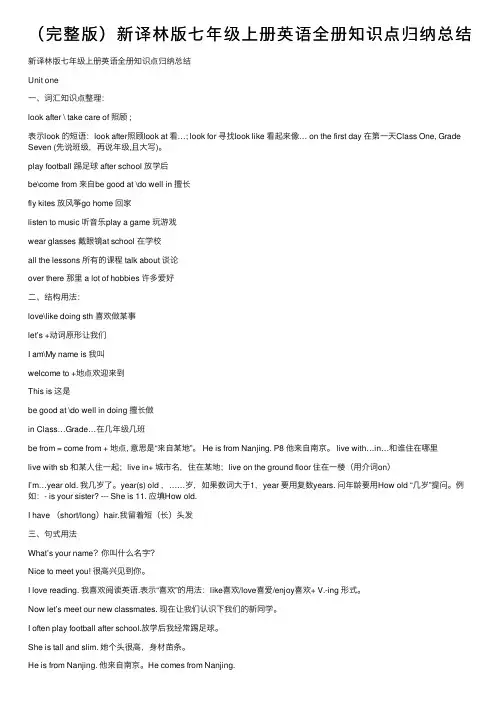
(完整版)新译林版七年级上册英语全册知识点归纳总结新译林版七年级上册英语全册知识点归纳总结Unit one⼀、词汇知识点整理:look after \ take care of 照顾 ;表⽰look 的短语:look after照顾look at 看…; look for 寻找look like 看起来像… on the first day 在第⼀天Class One, Grade Seven (先说班级,再说年级,且⼤写)。
play football 踢⾜球 after school 放学后be\come from 来⾃be good at \do well in 擅长fly kites 放风筝go home 回家listen to music 听⾳乐play a game 玩游戏wear glasses 戴眼镜at school 在学校all the lessons 所有的课程 talk about 谈论over there 那⾥ a lot of hobbies 许多爱好⼆、结构⽤法:love\like doing sth 喜欢做某事let’s +动词原形让我们I am\My name is 我叫welcome to +地点欢迎来到This is 这是be good at \do well in doing 擅长做in Class…Grade…在⼏年级⼏班be from = come from + 地点, 意思是“来⾃某地”。
He is from Nanjing. P8 他来⾃南京。
live with…in…和谁住在哪⾥live with sb 和某⼈住⼀起;live in+ 城市名,住在某地;live on the ground floor 住在⼀楼(⽤介词on)I’m…year old. 我⼏岁了。
year(s) old ,……岁,如果数词⼤于1,year 要⽤复数years. 问年龄要⽤How old “⼏岁”提问。
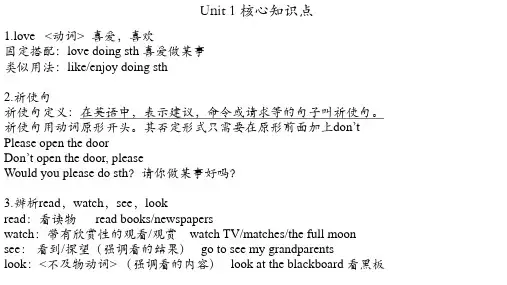
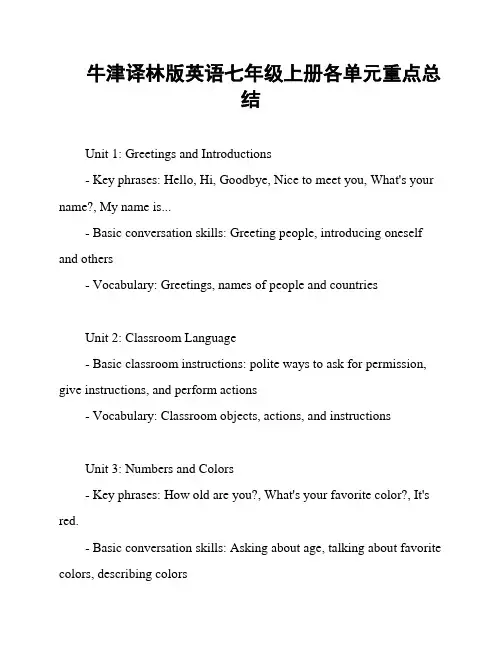
牛津译林版英语七年级上册各单元重点总结Unit 1: Greetings and Introductions- Key phrases: Hello, Hi, Goodbye, Nice to meet you, What's your name?, My name is...- Basic conversation skills: Greeting people, introducing oneself and others- Vocabulary: Greetings, names of people and countriesUnit 2: Classroom Language- Basic classroom instructions: polite ways to ask for permission, give instructions, and perform actions- Vocabulary: Classroom objects, actions, and instructionsUnit 3: Numbers and Colors- Key phrases: How old are you?, What's your favorite color?, It's red.- Basic conversation skills: Asking about age, talking about favorite colors, describing colors- Vocabulary: Numbers, colors, ageUnit 4: My Family- Key phrases: How many people are there in your family?, This is my mother/father/sister/brother.- Basic conversation skills: Talking about family members, describing family relationships- Vocabulary: Family members, possessive pronounsUnit 5: My School- Key phrases: What's your favorite subject?, Do you like...?, Yes, I do. / No, I don't.- Basic conversation skills: Talking about school subjects, expressing likes and dislikes- Vocabulary: School subjects, opinionsUnit 6: My Friends- Key phrases: Who's your best friend?, What does he/she look like?, He/She is...- Basic conversation skills: Talking about friends, describing appearance- Vocabulary: Words to describe people's physical appearanceUnit 7: Free Time Activities- Key phrases: What do you do in your free time?, I like playing football / reading books / listening to music.- Basic conversation skills: Talking about hobbies and free time activities- Vocabulary: Hobbies and leisure activitiesUnit 8: Daily Routines- Key phrases: What time do you get up/go to bed/eat breakfast?, I get up at.../Go to bed at.../Eat breakfast at...- Basic conversation skills: Talking about daily routines and telling the time- Vocabulary: Daily activities, timeUnit 9: Food and Drinks- Key phrases: Do you like...?, Yes, I do. / No, I don't., Can I have some...?, Sure, here you are.- Basic conversation skills: Talking about food preferences, ordering food and drinks- Vocabulary: Food and drinks, likes and dislikesUnit 10: Clothes- Key phrases: What are you wearing?, I'm wearing a T-shirt/trousers/skirt/shoes, etc.- Basic conversation skills: Talking about clothes and describing what someone is wearing- Vocabulary: Clothing itemsUnit 11: Weather- Key phrases: What's the weather like today?, It'ssunny/rainy/cloudy/windy, etc.- Basic conversation skills: Talking about the weather and describing weather conditions- Vocabulary: Weather words and phrasesUnit 12: Holidays and Celebrations- Key phrases: When is...?, It's on..., What do people do on...?, People usually...- Basic conversation skills: Talking about holidays and celebrations, discussing traditions and customs- Vocabulary: Holidays and celebrations, activities以上是牛津译林版英语七年级上册各单元的重点总结,希望对您有所帮助。
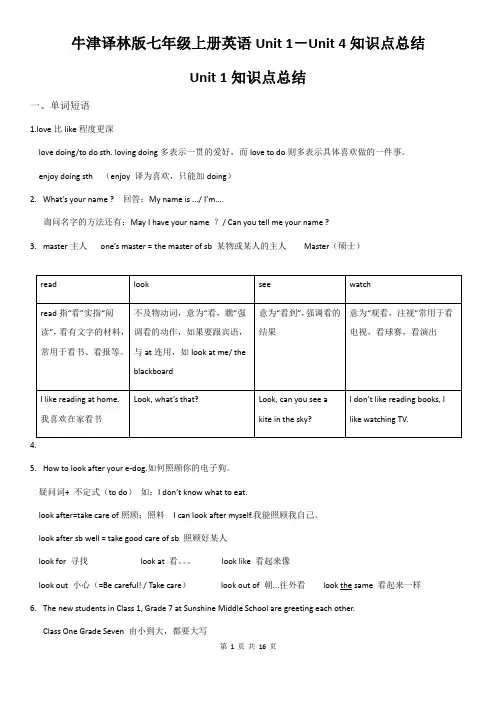
牛津译林版七年级上册英语Unit 1-Unit 4知识点总结Unit 1知识点总结一、单词短语1.love比like程度更深love doing/to do sth. loving doing多表示一贯的爱好,而love to do则多表示具体喜欢做的一件事。
enjoy doing sth (enjoy 译为喜欢,只能加doing)2.What's your name ? 回答:My name is .../ I’m....询问名字的方法还有:May I have your name ?/ Can you tell me your name ?3.master主人one’s master = the master of sb 某物或某人的主人Master(硕士)4.5.How to look after your e-dog.如何照顾你的电子狗。
疑问词+ 不定式(to do)如:I don’t know what to eat.look after=take care of照顾;照料I can look after myself.我能照顾我自己。
look after sb well = take good care of sb 照顾好某人look for 寻找look at 看。
look like 看起来像look out 小心(=Be careful! / Take care)look out of 朝...往外看look the same 看起来一样6.The new students in Class 1, Grade 7 at Sunshine Middle School are greeting each other.Class One Grade Seven 由小到大,都要大写用法相同的还有number ,lesson,unit,group,roomI’m in Grade 7.(对划线部分提问)What/ Which grade are you in?Our school has six grades.我们学校有6个年级。
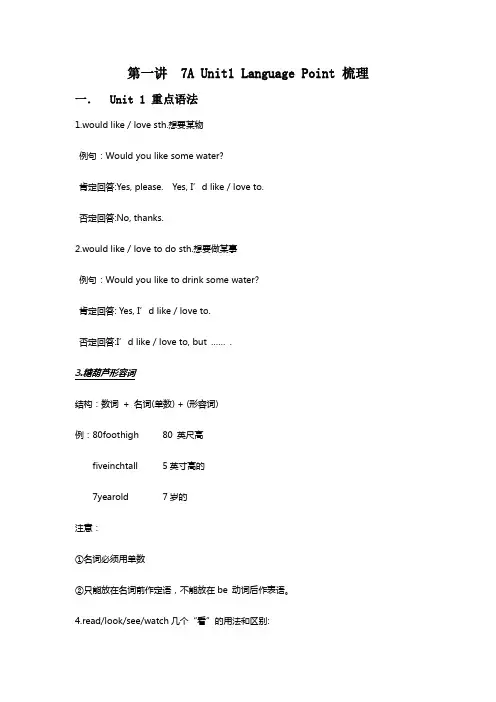
第一讲 7A Unit1 Language Point 梳理一.Unit 1 重点语法1.would like / love sth.想要某物例句:Would you like some water?肯定回答:Yes, please. Yes, I’d like / love to.否定回答:No, thanks.2.would like / love to do sth.想要做某事例句:Would you like to drink some water?肯定回答: Yes, I’d like / love to.否定回答:I’d like / love to, but …… .3.糖葫芦形容词结构:数词+ 名词(单数) + (形容词)例:80foothigh 80 英尺高fiveinchtall 5英寸高的7yearold 7岁的注意:①名词必须用单数②只能放在名词前作定语,不能放在be 动词后作表语。
4.read/look/see/watch几个“看”的用法和区别:look 强调看的动作①系动词。
译作看起来,后接形容词。
She looks happy.②不及物动词。
译作看,词组:look at…,用副词修饰。
Tom looked at me angrily.see 及物动词,译作看到,无进行时态,强调看的结果。
watch 及物动词,译作观看,注视。
强调观看正在进行中的,发生变化的活动过程,常用于看电视、看球赛、看演出等。
read 及物动词,译作阅读。
强调看文字内容的东西,常用于看书、看报纸、看杂志等。
5.疑问代词what、which、who 及疑问副词how、when 、where可以和动词不定式连用。
what to do 做什么which to do 做哪个who to do 如何做how to do 谁做when to do 什么时候做where to do 在哪里做6.“疑问词+ to do” 结构经常放在know,learn,see ,ask等动词后做宾语。
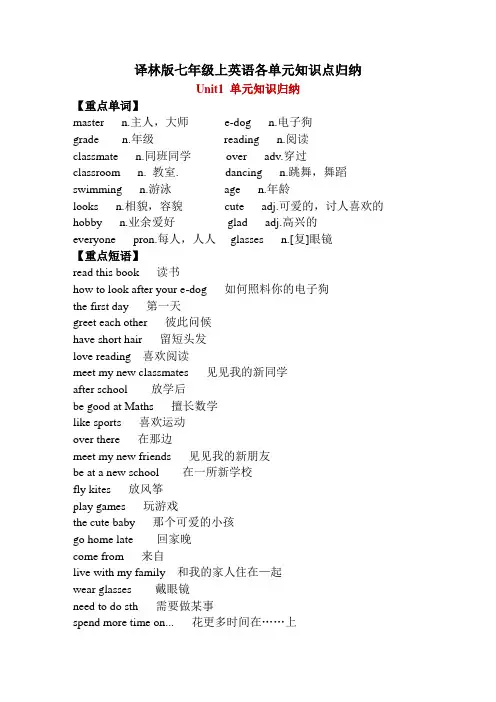
译林版七年级上英语各单元知识点归纳Unit1 单元知识归纳【重点单词】master n.主人,大师e-dog n.电子狗grade n.年级reading n.阅读classmate n.同班同学over adv.穿过classroom n. 教室. dancing n.跳舞,舞蹈swimming n.游泳age n.年龄looks n.相貌,容貌cute adj.可爱的,讨人喜欢的hobby n.业余爱好glad adj.高兴的everyone pron.每人,人人glasses n.[复]眼镜【重点短语】read this book 读书how to look after your e-dog 如何照料你的电子狗the first day 第一天greet each other 彼此问候have short hair 留短头发love reading 喜欢阅读meet my new classmates 见见我的新同学after school 放学后be good at Maths 擅长数学like sports 喜欢运动over there 在那边meet my new friends 见见我的新朋友be at a new school 在一所新学校fly kites 放风筝play games 玩游戏the cute baby 那个可爱的小孩go home late 回家晚come from 来自live with my family 和我的家人住在—起wear glasses 戴眼镜need to do sth 需要做某事spend more time on... 花更多时间在……上【典句必背】What’s your name? 你叫什么名字?Nice to meet you.见到你很髙兴。
I love reading.我爱读书。
I often play football after school.放学后我经常踢足球。
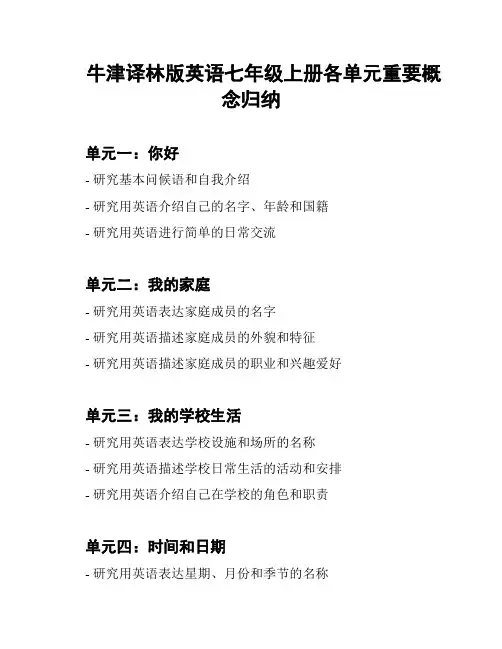
牛津译林版英语七年级上册各单元重要概
念归纳
单元一:你好
- 研究基本问候语和自我介绍
- 研究用英语介绍自己的名字、年龄和国籍
- 研究用英语进行简单的日常交流
单元二:我的家庭
- 研究用英语表达家庭成员的名字
- 研究用英语描述家庭成员的外貌和特征
- 研究用英语描述家庭成员的职业和兴趣爱好
单元三:我的学校生活
- 研究用英语表达学校设施和场所的名称
- 研究用英语描述学校日常生活的活动和安排
- 研究用英语介绍自己在学校的角色和职责
单元四:时间和日期
- 研究用英语表达星期、月份和季节的名称
- 研究用英语询问和回答关于时间和日期的问题- 研究用英语描述日常活动的时间和顺序
单元五:我的日常生活
- 研究用英语描述自己的日常活动和作息时间- 研究用英语询问和回答关于日常生活的问题- 研究用英语描述喜欢的食物、运动和爱好
单元六:购物
- 研究用英语表达购物场所和商品的名称
- 研究用英语询问和回答关于购物的问题
- 研究用英语描述购物时的交流和讨价还价
单元七:体育运动
- 研究用英语表达不同的体育运动项目
- 研究用英语询问和回答关于体育运动的问题- 研究用英语描述自己参与过的体育运动经历
单元八:健康和饮食
- 研究用英语表达健康和饮食方面的词汇
- 研究用英语询问和回答关于健康和饮食的问题
- 研究用英语描述自己的饮食偏好和健康惯
以上为《牛津译林版英语七年级上册》各单元的重要概念归纳。
*Note:* *此文档为简要概述,以帮助读者快速了解各单元内容,具体细节可参考教材。
*。
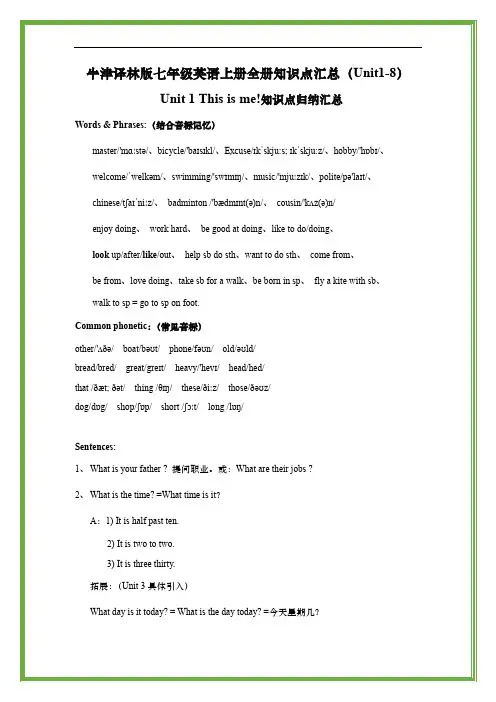
牛津译林版七年级英语上册全册知识点汇总(Unit1-8)Unit 1 This is me!知识点归纳汇总Words & Phrases:(结合音标记忆)master/'mɑːstə/、bicycle/'baɪsɪkl/、Excuse/ɪkˈskju:s; ɪkˈskju:z/、hobby/'hɒbɪ/、welcome/ˈwelkəm/、swimming/'swɪmɪŋ/、music/'mjuːzɪk/、polite/pə'laɪt/、chinese/tʃaɪˈniːz/、badminton /'bædmɪnt(ə)n/、cousin/'kʌz(ə)n/enjoy doing、work hard、be good at doing、like to do/doing、look up/after/like/out、help sb do sth、want to do sth、come from、be from、love doing、take sb for a walk、be born in sp、fly a kite with sb、walk to sp = go to sp on foot.Common phonetic:(常见音标)other/'ʌðə/ boat/bəʊt/ phone/fəʊn/ old/əʊld/bread/bred/ great/greɪt/ heavy/'hevɪ/ head/hed/that /ðæt; ðət/ thing /θɪŋ/ these/ðiːz/ those/ðəʊz/dog/dɒg/ shop/ʃɒp/ short /ʃɔːt/ long /lɒŋ/Sentences:1、What is your father ? 提问职业。
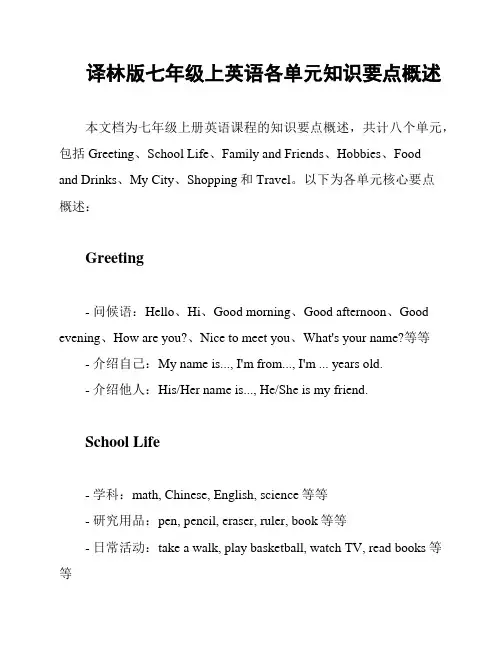
译林版七年级上英语各单元知识要点概述本文档为七年级上册英语课程的知识要点概述,共计八个单元,包括Greeting、School Life、Family and Friends、Hobbies、Foodand Drinks、My City、Shopping和Travel。
以下为各单元核心要点概述:Greeting- 问候语:Hello、Hi、Good morning、Good afternoon、Good evening、How are you?、Nice to meet you、What's your name?等等- 介绍自己:My name is..., I'm from..., I'm ... years old.- 介绍他人:His/Her name is..., He/She is my friend.School Life- 学科:math, Chinese, English, science等等- 研究用品:pen, pencil, eraser, ruler, book等等- 日常活动:take a walk, play basketball, watch TV, read books等等- 排课表达:What's your favorite subject? When is your English/Math/Science class?等等Family and Friends- 家庭成员:father, mother, sister, brother, grandparents等等- 拥有关系:My father/mother/sister/brother/...等等- 家庭环境描述:My home is...,I have a big/small/nice...等等- 问候;How is your family?/Do you have any brothers or sisters?Hobbies- 兴趣爱好:swimming, running, cycling, playing chess, playing the piano等等- 接受邀请:Would you like to.../Thank you for inviting me...等等- 邀请他人:Do you want to.../Would you like to...?Food and Drinks- 食品:pasta, bread, chicken, beef, fish, vegetables等等- 饮品:water, tea, coffee, juice等等- 快餐点餐:what would you like? I'd like...等等- 餐桌礼仪:please pass me/here you are/thank youMy City- 城市地理位置:My city is located in...- 城市特色:The weather in my city is..., My city is famous for... - 交通方式;take the bus/subway/ride a bike/walk等等- 报告天气情况:Today is...The temperature is...Shopping- 购物场所:store, supermarket, mall等等- 购物货物:clothes, shoes, bags, toys等等- 询问价格:How much is it?/How much are they?- 询问购买意向:Do you want to buy it?Travel- 旅游时间:in summer/vacation, on weekends等等- 旅游方式:by plane/train/bus/car/ship等等- 旅游地点:Beijing, Shanghai, Guangzhou等等- 对旅游地点的描述:The Great Wall is a popular place in Beijing...等等本文档对每个单元的核心要点进行了概括,以供大家学习参考,同时也希望同学们多加实践,加深对英语知识的理解和应用。

新译林版七年级上册英语全册知识点归纳总结以下是我为你准备的关于新译林版七年级上册英语全册的知识点归纳总结:第一单元:我们的学校本单元主要介绍了学校相关的词汇和句型,如school, classroom, teacher, student等。
同时,还学习了有关询问校园位置和个人信息的表达方式。
- 词汇:school, classroom, teacher, student, library, playground等第二单元:我们的课程本单元主要介绍了学校的各种课程和活动,以及表达自己课表和日常安排的方式。
学生通过学习这些内容,能够更好地了解学校的课程安排。
- 词汇:Chinese, math, English, science, geography等第三单元:我们的家庭本单元主要介绍了家庭成员、描述家庭成员特征、以及询问和回答有关家庭成员的相关问题的表达方式。
通过学习这些内容,学生能够更好地描述自己家庭的情况。
- 词汇:father, mother, brother, sister, grandparents等本单元主要介绍了城市生活中的一些词汇,如city, park, supermarket等,并通过学习如何提问和回答路线和位置的问题,帮助学生更好地适应城市生活。
- 词汇:city, park, supermarket, post office等第五单元:我们的节日本单元主要介绍了一些节日,如Spring Festival, Christmas等,并学习了表达节日祝福和邀请的方式。
通过学习这些内容,学生能够更好地了解不同的文化习俗。
- 词汇:Spring Festival, Christmas, birthday, Happy New Year等第六单元:我们的食物本单元主要介绍了食物相关的词汇和句型,如apple, banana, chicken等,并通过学习如何询问和回答关于食物的问题,帮助学生提高日常交流能力。
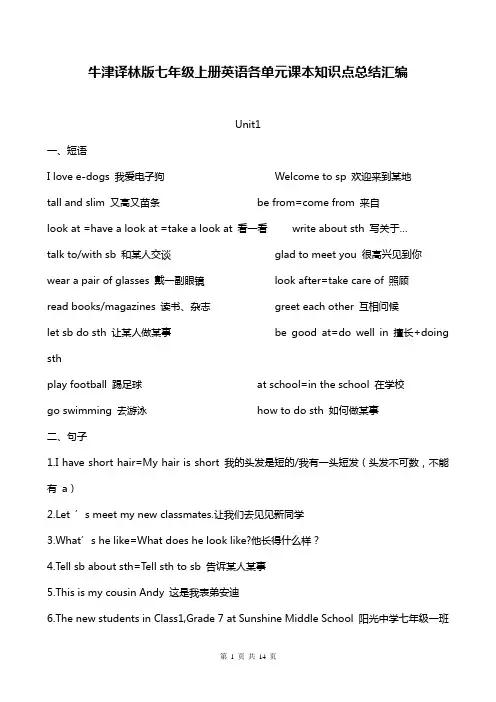
牛津译林版七年级上册英语各单元课本知识点总结汇编Unit1一、短语I love e-dogs 我爱电子狗Welcome to sp 欢迎来到某地tall and slim 又高又苗条be from=come from 来自look at =have a look at =take a look at 看一看write about sth 写关于…talk to/with sb 和某人交谈glad to meet you 很高兴见到你wear a pair of glasses 戴一副眼镜look after=take care of 照顾read books/magazines 读书、杂志greet each other 互相问候let sb do sth 让某人做某事be good at=do well in 擅长+doing sthplay football 踢足球at school=in the school 在学校go swimming 去游泳how to do sth 如何做某事二、句子1.I have short hair=My hair is short 我的头发是短的/我有一头短发(头发不可数,不能有a)2.Let ’s meet my new classmates.让我们去见见新同学3.What’s he like=What does he look like?他长得什么样?4.Tell sb about sth=Tell sth to sb 告诉某人某事5.This is my cousin Andy 这是我表弟安迪6.The new students in Class1,Grade 7 at Sunshine Middle School 阳光中学七年级一班7.Now I live with my family in Beijing 现在我和父母住在北京8.They are all very nice 他们都很友好/善良9.The first day at Sunshine Middle School 在阳光中学的第一天三、语法:连系动词be 的一般现在时动词be 的三变化am is are. 我(I)用am ,你(you)用are ,is 用于他(he)她(she)它(it),单数名词用is,复数名词都用are句型结构:1、肯定句:主语+am\is\are …It is a football.2、否定句:主语+am\is\are+not…It is not a football.3、一般疑问句:Am\Is\Are+主语+其他?Is it a football? 回答Yes, it is. No, it isn’t4、特殊疑问句:疑问句+am/is/are +主语+其他?What’s your name?Unit2一、短语like to do/doing sth 喜欢做某事twice a day 一天两次walk to sp=go to sp on foot 走去/步行去play tennis 打网球What about=how about …怎么样like…very much 非常喜欢…a member of……中的一名成员in one’s free time 在某人闲暇时make sb/sth +adj 使某人/某物怎么样want to do sth=would like to do 想要做某事watch ball games 看球赛Sometimes=at times=from time toReading is fun 读书很有趣once a day 一天一次three/four …times a day 一天…次football player 足球选手football star 足球明星play football well 篮球打得好listen to music 听音乐make sb/sth +v 原型使某人/某物做…play in the next World Cup 踢进下一个世界杯 a piece of information 一条信息answer a question 回答问题stay at home 待在家a lot of=lots of =many/much 许多talk with/to sb about sth 与某人谈论某事play with sb 和某人玩二、句子1.Eddie, do you like sports?艾迪,你喜欢体育吗?2.I walk to my bowl many times a day.我一天里走向我的碗许多次3.What is your favourite sport?=What sport do you like best?你最喜欢的体育运动是什么?4.He was born/comes from Guangdong, but now lives in Beijing.他出生于广东,但是现在居住在北京。
译林版英语七年级上册笔记一、Unit 1 This is me!1. 重点单词。
- e - dog:电子狗。
例如:I have an e - dog. Its name is Hobo.(我有一只电子狗。
它的名字叫霍波。
)- master:主人。
常搭配为“be the master of...”,表示“是……的主人”,如:I am the master of my life.(我是我生活的主人。
)- grade:年级;等级。
如:I'm in Grade 7.(我在七年级。
)也可用于表示成绩等级,如“get a good grade”(取得好成绩)。
- student:学生。
复数形式是“students”。
例如:There are many students in our school.(我们学校有很多学生。
)- reading:阅读;读物。
“like reading”(喜欢阅读),“do some reading”(阅读,做阅读练习)。
2. 重点短语。
- look after:照顾;照料。
等同于“take care of”。
例如:My mother looks after my little sister every day.(我妈妈每天照顾我的小妹妹。
)- welcome to...:欢迎来到……。
如:Welcome to our school.(欢迎来到我们的学校。
)- be from:来自。
可与“come from”互换。
例如:He is from Nanjing. = He comes from Nanjing.(他来自南京。
)3. 重点句型。
- Nice to meet you. /Nice to meet you too.:用于初次见面时互相打招呼。
- I love reading. / I like playing football.:表达爱好的句型,“love/like + doing sth.”表示喜欢做某事。
译林版七年级上英语各单元知识归纳整理Unit 1 Meet My FamilyIn this unit, we learn vocabulary and phrases related to family members. We also learn how to introduce our family members using the verb "be" and possessive pronouns.Unit 2 This is my schoolThis unit focuses on vocabulary related to school subjects, classroom objects and school facilities. We also learn how to ask and answer questions about school subjects.Unit 3 My Favourite thingsIn this unit, we learn vocabulary related to hobbies and leisure activities. We learn how to talk about our favourite things using adjectives and the verb "like".Unit 4 The WeatherThis unit focuses on vocabulary related to different types of weather and seasons. We also learn how to ask and answer questions about the weather using the phrase "How's the weather?"Unit 5 At the weekendIn this unit, we learn vocabulary related to weekend activities. We also learn how to talk about our weekend using adverbs of frequency.Unit 6 Food and DrinksThis unit focuses on vocabulary related to food and drinks. We learn how to order food in a restaurant and use the phrases "What would you like?" and "I'd like..."Unit 7 How much are these socks?In this unit, we learn vocabulary related to shopping and prices. We learn how to ask and answer questions about the prices of different items using the phrase "How much is/are...?"Conclusion。
译林版英语七上知识点总结译林版英语七年级上册知识点总结一、重点单词1. subject 主题2. maths 数学3. science 科学4. English 英语5. history 历史6. geography 地理7. Chinese 语文8. physics 物理9. politics 政治10. biology 生物11. chemistry 化学体育13. computer studies 计算机学科14. favourite 最喜欢的15. because 因为16. among 在……之中17. describe 描述18. everyone 每个人19. no 不20. French 法语21. free 空闲的22. lunch 午餐23. twice 两次24. a week 一周一次25. twice a week 一周两次26. a morning 上午27. an afternoon 下午28. a year 一年29. a month 一个月30. a day 一天31. an hour 一小时32. a week 一周33. a year 一岁34. exciting 令人兴奋的,使人兴奋的35. favourite 最喜欢的(人)或事物36. the most beautiful 最美丽的(人或事物)37. the most boring 最无聊的(活动或事物)38. the most difficult 最难的(活动或事物)39. the most delicious 最美味的(食物)40. the most exciting 最令人兴奋的(活动或事物)41. the most important 最重要的(人或事物)42. the most interesting 最有趣的(故事或活动)43. the most popular 最受欢迎的(人或事物)44. the most relaxing 最放松的(活动或事物)45. the most useful 最有用的(人或事物)46. the most wonderful 最精彩的,最奇妙的,最美好的,最好的,最棒的(人或事物)47. wonderful 精彩的,奇妙的,美好的,最好的,最棒的(人或事物)48. what about…?/ how about…? ……怎么样?(表示建议、征求意见、询问等)49. and so on等等(表示列举未尽)50. what time 什么时间,几点钟(对钟点进行提问)。
牛津译林版七年级上册英语各单元语法知识点复习提纲Unit1 Dream homes【重点词汇】1. shareshare作及物动词,意为“分享”。
常用结构:share sth. with sb.意为“和某人合用某物;和某人分享某物”。
如:I'm afraid you have to share a table with others.我恐怕你得和别人合用一张桌子。
I often share my snacks with my classmates.我经常和同学分享零食。
2. dreamdream作名词时,意为“梦,梦想”;作形容词时,意为“理想的,不切实际的”;作动词时,意为“做梦”,常用于结构:dream of/about...(梦到……)或dream of/ about doing sth.梦想做某事。
如:Millie has a dream to have a big house米莉梦想拥有一幢大房子My dream house is a house with a big garden.我梦寐以求的房子是一幢带有大花园的房子。
I dreamed of my English teacher last night.我昨晚梦到了我的英语老师Amy dreams of being a singer when she grows up.埃米梦想长大后成为一名歌手。
3. ownown作形容词.意为“自己的,属于自己的”,常和形容词性物主代词连用,构成短语of one'sown,表示“属于某人自己的”,on one's own = alone,意为“独自地”。
own作动词时,表示“拥有”。
如:I have my own computer我有属于我自己的电脑。
That's a car of her own.那是她自己的汽车。
He lives on his own.他一个人生活。
译林版七年级上英语各单元知识点归纳Unit1 单元知识归纳【重点单词】master n.主人,大师e-dog n.电子狗grade n.年级reading n.阅读classmate n.同班同学over adv.穿过classroom n. 教室. dancing n.跳舞,舞蹈swimming n.游泳age n.年龄looks n.相貌,容貌cute adj.可爱的,讨人喜欢的hobby n.业余爱好glad adj.高兴的everyone pron.每人,人人glasses n.[复]眼镜【重点短语】read this book 读书how to look after your e-dog 如何照料你的电子狗the first day 第一天greet each other 彼此问候have short hair 留短头发love reading 喜欢阅读meet my new classmates 见见我的新同学after school 放学后be good at Maths 擅长数学like sports 喜欢运动over there 在那边meet my new friends 见见我的新朋友be at a new school 在一所新学校fly kites 放风筝play games 玩游戏the cute baby 那个可爱的小孩go home late 回家晚come from 来自live with my family 和我的家人住在—起wear glasses 戴眼镜need to do sth 需要做某事spend more time on... 花更多时间在……上【典句必背】What’s your name? 你叫什么名字?Nice to meet you.见到你很髙兴。
I love reading.我爱读书。
I often play football after school.放学后我经常踢足球。
译林版丨七年级英语上各单元重要知识点汇总Unit 1 This is me!1. look after sb. (well)好好照顾某人= take (good) care of sb.2. some of the new students新学生中的一些one of +可数名词复数…..中的一个many of +可数名词复数…..中的许多much of +不可数名词…..中的许多3. introduce A to B:把A介绍给Bintroduce yourself to the class把你自己介绍给全班myself yourself himself herself itself我自己你自己他自己她自己它自己ourselves yourselves themselves我们自己你们自己他们自己4. greet each other相互问候5. Good night!晚安!Good evening!早晨好!6. love doing….酷爱/爱好做….like doing….喜爱做….enjoy doing….喜欢/享受做….7. let sb. do sth.让某人做某事make sb. do sth.使某人做某事使役动词let, make背面接省to的动词不定式充任宾语补足语8. like sports喜爱运动9. after school放学后after class课后in class在课上10. be good at (doing)……擅长(做)某事=do well in (doing)……11. match…with…把….与…..搭配起来12. talk to…对或人发言talk with….与某人交谈13. tell sb. about sth.通知或人关于某事14. Oh, I see.哦,我明白了。
15. the rest of….…..中剩余的17. read the following words读下面的这些单词18. pay attention to (doing)sth.注意(做)某事19. according to…..根据20. in the centre of the city在市中心21. wear glasses戴着眼镜22. like all the lessons喜欢所有的功课23. fill in the table with your own information用你自己的息填表格24. use sth. to do sth.用某物做某事25. need作为行动动词的用法:need to do /don’t / doesn’t need to doneed作为神态动词的用法:need do / needn’t do26. spend +时间/钱on sth.(在某事上花费时间/钱)spend +工夫/钱(in) doing sth.(在做某事上破费工夫/钱)spend more time on sth.(在某事上花更多时间)1. How to look after your e-dog.(如何照顾你的电子狗。
译林版丨七年级英语上各单元重要知识点汇总Unit 1 This is me!1. look after sb. (well)好好照顾某人= take (good) care of sb.2. some of the new students新学生中的一些one of + 可数名词复数…..中的一个many of + 可数名词复数…..中的许多much of + 不可数名词…..中的许多3. introduce A to B :把A介绍给Bintroduce yourself to the class把你自己介绍给全班myself yourself himself herself itself我自己你自己他自己她自己它自己ourselves yourselves themselves我们自己你们自己他们自己4. greet each other 互相问候5. Good night! 晚安!Good evening! 晚上好!6. love doing…. 热爱/喜爱做….like doing…. 喜爱做….enjoy doing…. 喜欢/享受做….7. let sb. do sth. 让某人做某事make sb. do sth. 使某人做某事使役动词let, make后面接省to的动词不定式充当宾语补足语8. like sports 喜爱运动9. after school 放学后after class 课后in class 在课上10. be good at (doing)……擅长(做)某事=do well in (doing)……11. match…with…把….与…..搭配起来12. talk to…对某人讲话talk with …. 与某人交谈13. tell sb. about sth. 告诉某人关于某事14. Oh, I see. 哦,我明白了。
15. the rest of …. …..中剩余的17. read the following words读下面的这些单词18. pay attention to (doing)sth.注意(做)某事19. according to….. 根据20. in the centre of the city 在市中心21. wear glasses 戴着眼镜22. like all the lessons 喜欢所有的功课23. fill in the table with your own information 用你自己的信息填表格24. use sth. to do sth. 用某物做某事25. need作为行为动词的用法:need to do /don’t / doesn’t need to doneed作为情态动词的用法:need do / needn’t do26. spend +时间/钱on sth.(在某事上花费时间/钱)spend +时间/钱(in) doing sth. (在做某事上花费时间/钱)spend more time on sth. (在某事上花更多时间)1. How to look after your e-dog.(如何照顾你的电子狗。
)2. I have short hair. = My hair is short.我短发。
3. Let’s meet my newclassmates.让我们见见我的新同学。
4. She is tall and slim.她高而苗条。
5. Daniel is from Nanjing.Daniel来自南京。
=Daniel comes from Nanjing.6. She loves dancing.她热爱舞蹈。
7. She is good at swimming.她擅长游泳。
= She does well in swimming.8. This is my cousin Andy.这是我的表弟Andy.9. Andy, this is my new classmate Kitty.Andy, 这是我的新同学Kitty.10. I come from Nanjing, but now I live with my family in Beijing. 我来自南京,但现在我和父母住在北京。
11. They are all very nice. 他们都很好。
Unit 2 Let’s play sports!1. play sports 做运动2. like walking 喜欢散步go for a walk 去散步take a walk 散步3. enjoy oneself = have a good time 玩得开心= have fun = play happily4. be free 有空be busy 繁忙5. hope to do sth. 希望做某事hope (that) + 句子希望+ 宾语从句6. have a dream 做梦7. come true (梦想)实现,成为现实8. at/on weekends = at / on theweekend 在周末9. of course = certainly =sure 当然10. shop v.购物shopper n. 购物者11. else 放在不定代词或疑问代词之后something else 别的东西nothing else 没有别的东西what else 别的什么,还有什么12. a lot of = lots of 许多(修饰可数名词、不可数名词)some 一些(修饰可数名词、不可数名词)many 许多(修饰可数名词)much 许多(修饰不可数名词)13. fun 不可数名词乐趣、享乐、有趣的事What great fun! 多么有趣的事情啊!fun--funny fun sports 有趣的运动14. talk about 谈论talk of 谈到,说到15. hero –heroes16. many times a day 一天很多次once a week 一周一次twice a month 一月两次three times a year 一年三次17. my favourite football player我最喜爱的足球队员18. a new member of HuangheFootball Club 黄河足球俱乐部的一个新成员19. look strong 看起来强壮20. play football very well 足球踢得很好21. in one’s free time 在某人的空余时间里22. enjoy listening to music 喜欢听音乐23. make sb. do sth. 使某人做某事make sb. + adj. 使某人……make him happy 使他们开心make me sad 使我悲伤24. make a card about Li Hua制作一张关于李华的卡片25. however 使用时习惯用标点符号与前后句隔开26. activity ---- activities 活动27. watch ball games on TV在电视上看球赛28. 对sometimes,often, usually, always, never, once a week, twice a month等表示频率的词或短语提问用how often29. read the phrases below读下面的短语30. take this bag 拿这个包句子:1. Are you free? = Do you have time?你有空吗?2. What’s your favourite sport?你最喜欢的运动是什么?3. He also enjoys listening to music.他也喜欢听音乐。
4. Li Hua wants to play in the next World Cup.李华想参加下届世界杯。
5. I hope his dream comes true.我希望他的梦想实现。
6. How does he look?他看上去怎样?What does he look like?他看上去像什么?7. Do your parents go with you?你父母和你一起去吗?8. My dad sometimes watches our games. 我爸爸有时候观看我们的比赛。
9. My mum often shops at weekends.我妈妈常在周末购物。
10. I often stay at home.我常待在家里。
11. Many of my students likesports.我的学生中有许多学生喜欢运动。
12. What else do you like to do?你还喜欢做别的什么事吗?=What other things do you like to do?13. It makes me feel great.它使我感到很棒。
14. I like reading too.我也喜欢阅读。
15. Me, too. Reading is fun.我也是。
阅读很有趣。
16. I often play basketball with my friends after school.我常在放学后与朋友一起打篮球。
17. We often talk about basketball and watch basketball matches on TV.我们常谈论篮球并在电视上看篮球比赛。
Unit 3Welcome to our school!1.on the Open Day 在开放日2. be ready to do…. 准备好做….3.the parents’meeting 家长会4. at the school gate=at the gate of the school在学校大门口5. so big 如此大6. watch two of our lessons观摩我们的两节课7. let me show you around让我带你参观8.on the ground floor 在一楼(英)9. this way 这边走10. by the way 顺便说说,顺便问一下11. have a meeting / have meetings at the school hall 在学校礼堂开会12.look at the picturesof my friends on the wall 看墙上我的朋友们的照片13. classroom building= teaching building教学楼14. be nice / kind to sb. 对某人好15. It’s very nice/kind of you to do sth.你做某事真好16. very much 很,挺17. want to say hello to sb.想向某人问好18. say goodbye to sb. 向某人告别say sorry to sb. 向某人道歉19. get to school 到达学校20. take the bus to school乘公交车上学=go to school by bus=go to school ona / the bus21. ride a bike to school骑自行车上学=go to school by bike=go to school onone’s bike22. keep a diary(diaries) 写日记23. live near the school住学校附近24. live far away from the school住得远离学校25. all kinds of books 各种可样的书26. borrow sth. from sb. 跟某人借某物27. borrow books from the library从图书馆借书28. on one’s way back 在某人回来的路上29. on one’s way home 在某人回家的路上30. on one’s way to school在某人上学的路上31. Thank sb. for sth. 因为某事谢谢某人Thanks for sb32. Thank sb. for doing sth.为干某事谢谢某人34. Thank you /Thanks for tell ing me how to have a party. 谢谢你告诉我怎样举办一个晚会。